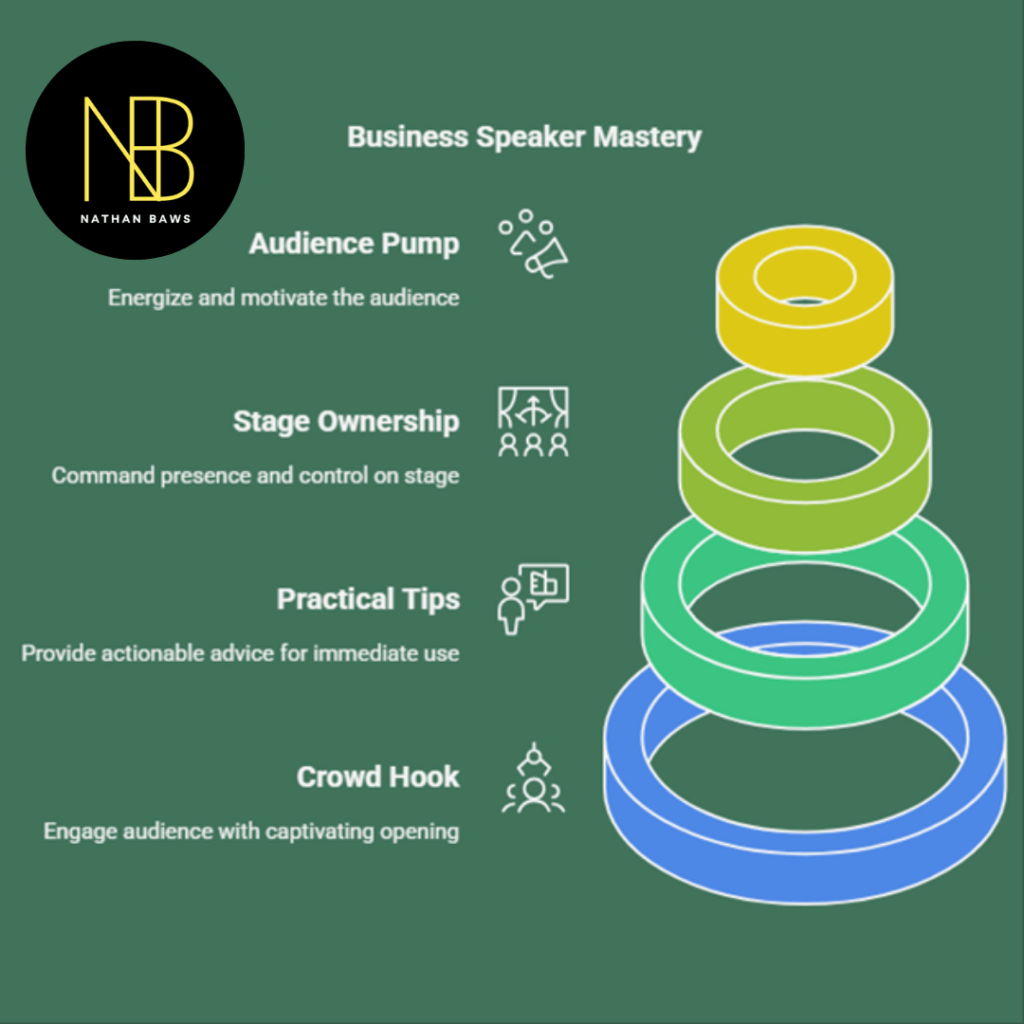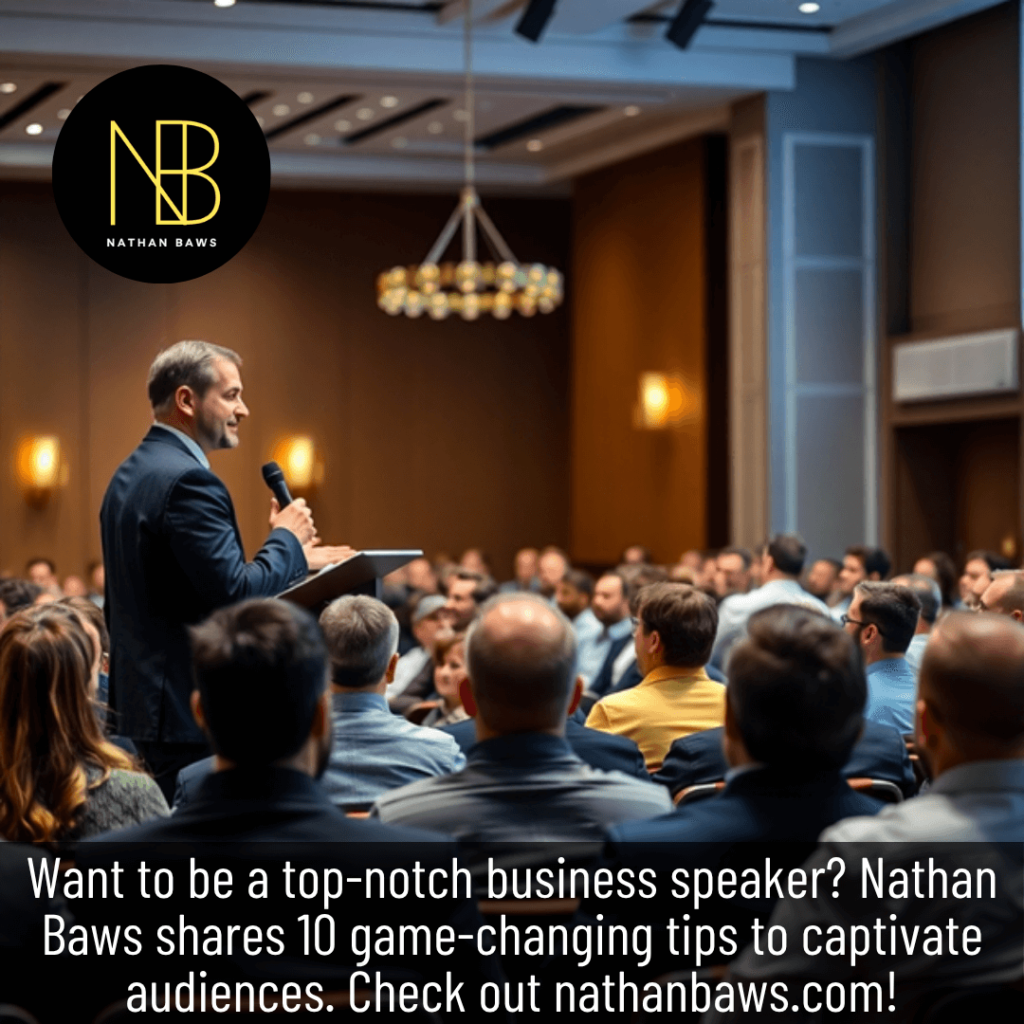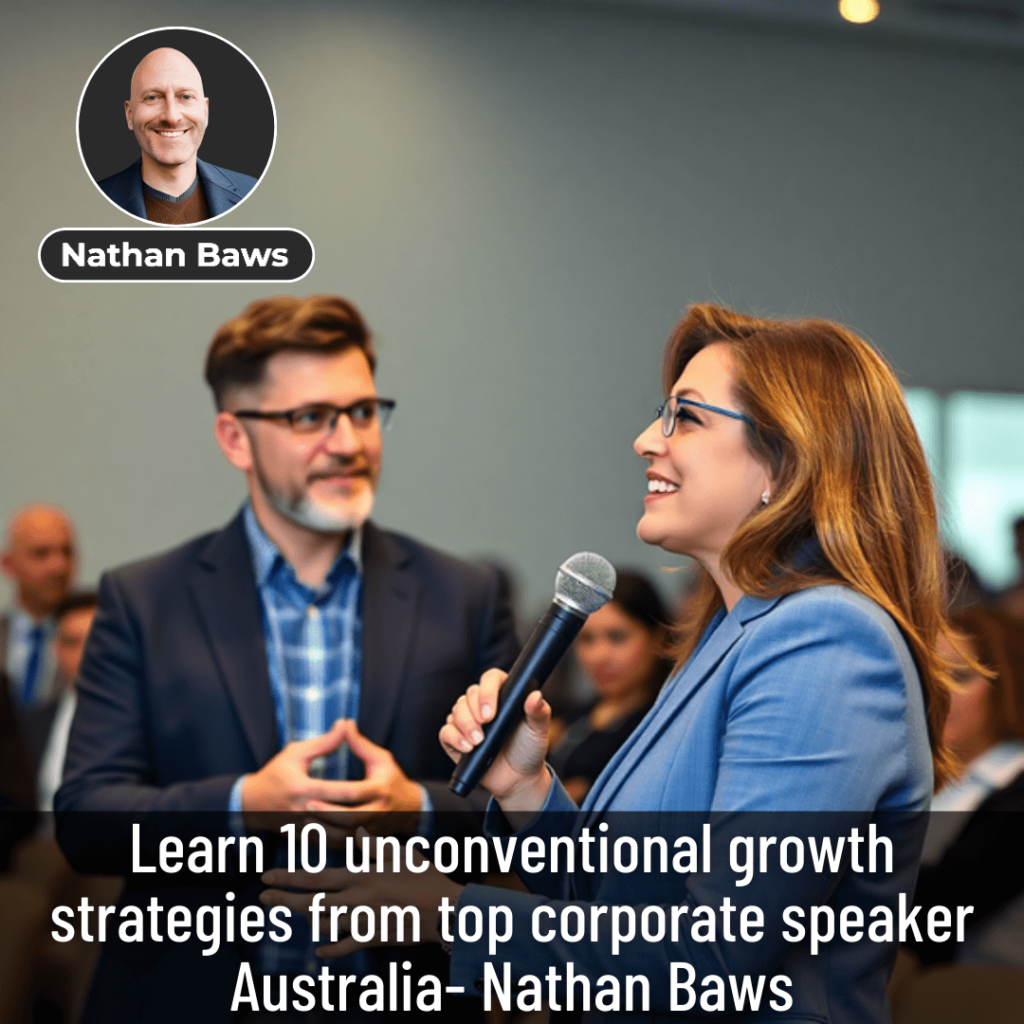Introduction
G’day legends! Ever seen a business speaker stroll onto the stage and just own it? The crowd’s hanging on every word, laughing, nodding, maybe even jotting down notes. That’s the dream, right? I’m Nathan Baws, and after years of yakking to businesses from Sydney to Perth, I’ve picked up a few tricks to make any talk a ripper. Whether you’re shaking in your boots at the thought of a microphone or you’re a pro chasing that extra spark, these 10 secrets will have you wowing crowds like nobody’s business. So, chuck on the kettle, and let’s have a chinwag about how to be a business speaker everyone remembers.
What You’ll Learn
- How to grab the room’s attention faster than a kangaroo on a trampoline.
- Why stories are your best mate for making a talk stick.
- Tips to turn those pre-speech jitters into pure gold.
- Ways to dish out advice your audience can use the next day.
- How Nathan Baws can help you become a cracking business speaker.
1. Start with a Bang That Echoes
You’ve got about as long as it takes to scoff a Tim Tam to make the crowd love you. A killer opening is your foot in the door as a business speaker.
Why the First Bit Matters
I stuffed up a talk years back—kicked off with some lame line about the weather. The room went quieter than a pub on a Monday morning. Your opening’s your chance to say, Oi, this is worth your time. Try a punchy question like, Who’s ever sat through a meeting and wanted to scream?” or a stat like, 70% of teams tank because no one’s leading. It’s your handshake with the audience—make it firm.
Nailing That Hook
Think of your start like the first scene of a cracking movie. I once opened a gig in Brisbane with, Hands up if you’ve ever had a boss who made you want to quit. Half the room laughed, and we were mates already. Keep it short, make it about them, and tease what’s coming. That’s how a business speaker sets the vibe.
Stuff to Dodge
Don’t bang on about yourself or mumble, Thanks for having me. No one’s here for your life story yet. And skip the cheesy icebreakers—nobody wants to turn to your neighbour and share your star sign. Get to the good stuff quick, or you’ll lose ‘em.
2. Spin a Yarn That Sticks
Stories are the Vegemite of public speaking—simple, classic, and brilliant. They’re what make your talk linger in people’s heads.
Why Stories Are Your Mate
I’ve given talks where I rattled off stats, and you could see eyes glazing over. But when I shared a story about a little Adelaide bakery that turned things around with a staff pep talk, the room lit up. Stories hit the heart, not just the head. As a business speaker, they’re your shortcut to connection.
How to Tell a Good One
Share Something Real
It helps to share a real story. It could be about a time you learned something. It could be about a mistake you made. It could be about a small success. I often talk about a time I had to speak to an important client. I forgot my slides. I had to speak without them. I stayed honest. Somehow, it worked. That story stayed with me. It helps others see I am not perfect. Keep the story short. Make sure it connects to your message. Do not speak too long. People lose focus.
Keep Your Story Simple and Honest
You do not have to act perfect. You do not have to act like you know everything. A business speaker who shares small, real stories connects better with people. It could be something simple. Like helping someone quiet on your team speak up. That is real. People in the room understand that. They see themselves in that moment. That is why they listen..
3. Use Your Body the Right Way
Your words are one part of the talk. How you stand and how you move also matter. As a business speaker, the way you use your body makes a difference.
Stand Still and Be Clear
When I first started speaking, I moved too much. I walked all over the place. It made me look nervous. Now, I stand still. I stand tall. I keep my shoulders back. I look at the people in the room. It shows I am ready. It shows I have something to say. You can practise standing in a way that feels calm but strong. That helps people listen.
Gestures That Work
Don’t wave your hands like you’re directing traffic. Use them to back up your words—point for a big idea, open your hands to show you’re on their side. I’ve watched legends like TED speakers, and their gestures are subtle but powerful. As a business speaker, your hands should feel like an extension of your voice.
Look ‘Em in the Eye
Eye contact’s your secret weapon. I pick out a few faces in the crowd and give ‘em a quick look—like I’m having a yarn just with them. It builds trust. A business speaker who stares at their notes or the ceiling feels like they’re hiding something. Look up, connect, win.

4. Turn Nerves into Nitro
Even old hands like me get a bit of a wobble before a big talk. The trick is using those butterflies to fuel your fire.
Nerves Mean You Care
I’ve been speaking for donkey’s years, and I still get a flutter before a gig. That’s not a bad thing—it’s your body saying, “This matters.” A bit of adrenaline sharpens you up, like a double espresso before a big meeting. The key is not letting it take over.
Tricks to Stay Chill
Deep breathing’s my go-to. Four seconds in, hold, four out. I do it in the loo before a talk to stop my heart racing like a greyhound. Know your stuff cold—that’s half the battle. And if you muck up? Chuckle. I once called a client by the wrong name mid-talk. Laughed it off, and the crowd loved me for it. A business speaker who’s human is a business speaker people trust.
Picture the Win
Before I step up, I imagine the crowd clapping, maybe even chucking a “you beauty!” my way. Sounds daggy, but it works. It’s like psyching yourself up for a footy match. See yourself as the business speaker you want to be, and you’ll start acting like it.
5. Give ‘Em Something They Can Use
Nobody wants a talk that’s all fluff and no substance. A top business speaker hands out ideas the crowd can take home and run with.
Why Practical’s the Go
I’ve sat through talks that sounded flash but left me thinking, So what? Your audience wants stuff they can action. If you’re banging on about leadership, don’t just say inspire your team. Tell ‘em to try a 10-minute morning huddle to set the day’s vibe. That’s the kind of gold people thank you for.
Keep It Simple
I love a clear framework. For example, I break teamwork into Talk, Trust, Win. It’s easy to grab onto. Lay out your tips like a recipe—step one, step two, done. A business speaker who makes complex stuff clear is a bloody hero.
A Real Win
One of my clients, a Perth café owner, started using a tip I shared about upselling with a smile. Their takings jumped 15% in a month. Stories like that show your ideas aren’t just talk—they work. Share ‘em, and your crowd’ll see you’re the real deal.
6. Get the Crowd In on the Act
A business speaker who lectures like a cranky teacher loses the room. Get your audience involved, and they’ll be eating out of your hand.
Ask ‘Em Something
Throw out a question like, Who’s had a nightmare client? I did this at a Melbourne gig, and the room erupted with laughs and nods. It’s like inviting them into the convo. People love feeling seen.
Crack a Laugh
A bit of Aussie humour’s a winner. I once joked about my shocking PowerPoint skills—got a proper belly laugh. Keep it light, maybe poke fun at yourself. A business speaker who makes the crowd smile builds mates, not just listeners.
Get ‘Em Moving
Try something simple, like asking everyone to share a quick thought with the person next to ‘em. I did this in Canberra, and the room went from quiet to buzzing. People love being part of the show—it makes your talk a memory, not just a moment.
7. Deliver Like a Pro
You could have the best content in the world, but if your delivery’s flatter than a roadkill goanna, no one’s listening. A great business speaker brings their words to life.
Play with Your Voice
Monotone’s a snooze-fest. I mix it up—slow for big points, quick when I’m pumped. Practice punching up words like growth or change. It’s like adding hot sauce to your talk—just enough to wake ‘em up.
Pause for Power
A well-timed pause is pure magic. Drop a big idea, then let it hang for a sec. I learned this after blitzing through a talk and watching half the crowd zone out. Give ‘em space to think, and your words hit harder.
Practice Till It’s Second Nature
I rehearse in front of my dog—she’s a tough critic. Record yourself too; you’ll spot tics like saying um every five seconds. I did, and it was a wake-up call. The more you prep, the more you’ll shine as a business speaker without sounding like a robot.
Conclusion
There you have it—10 ripper tricks to make you the business speaker everyone’s banging on about. From hooking the crowd to dishing out tips they can use, these ideas will have you owning the stage and leaving audiences pumped. Here at Nathan Baws, we’re all about helping legends like you inspire and make waves. Want to take your speaking to the next level or fire up your team? Pop over to nathanbaws.com for a yarn—we’ll get you sorted!
Also Read: 10 Unorthodox Growth Hacks That Helped Me Thrive After Shark Tank
FAQs
What makes a good business speaker?
It is not only about talking. It is about connecting with people. A business speaker should share stories. They should give simple tips people can use. They should be themselves. I have seen speakers who try to act like someone they are not. It does not work. They lose the audience. It is better to prepare well. But let your real self show when you speak.
How do I feel less nervous before I speak?
Most people feel nervous. I do too. Breathe slow. Practise your talk. Picture it going well. If you slip up, keep going. It gets easier each time.
Why do stories help make a talk better?
Stories help people remember. They stick in your mind. You can share facts, but stories stay with people longer. A simple story, like how a client fixed a small problem, helps people understand. It feels real. It feels honest. A small, real story often connects more than a big success story. That is what makes a business speaker memorable.
What’s the best way to kick off a speech?
Start with a zinger—a question, stat, or quick yarn. I opened a talk with, “Who’s ever wanted to throttle their boss?” and got instant laughs. Skip the “thanks for being here” waffle. Make it about the crowd from word one. A sharp start shows you’re a business speaker who’s here to deliver, not just fill time.
How do I make my talk useful?
Give ‘em stuff they can do tomorrow. Don’t just say “be better”—tell ‘em to try a daily team catch-up or a new feedback trick. A client of mine boosted sales with a tip I shared about greeting customers by name. Break your ideas into clear steps. A business speaker who hands out takeaways earns fans, not just claps.
Is body language a big deal?
Too right it is. Slouching or fidgeting screams “I’m nervous.” Stand tall, use your hands to underline your words, and look people in the eye. I used to flap my arms like a galah till a mate called me out. Now I keep it controlled but natural. Good body language makes you a business speaker people trust.
How do I keep the crowd awake?
Get ‘em in the game. Ask, “Who’s dealt with a dodgy coworker?” or get ‘em to share an idea with a neighbour. I did this in Sydney, and the room went nuts. A bit of humour helps too—I’ve cracked jokes about my terrible handwriting and got giggles. Keep the vibe up, and they’ll stay with you.
How much should I practice?
Till you’re comfy but not a robot—say, 5-10 run-throughs. I practice in front of my mirror or my dog (she’s brutal). Record yourself to catch “ums” or weird tics. I did and nearly died of embarrassment. Know your key points so you can riff if needed. A well-prepped business speaker feels like a mate, not a script.
Does a bit of humour help?
You bet. A cheeky jab at yourself or a funny work moment loosens everyone up. I once laughed about a slideshow that crashed mid-talk—crowd loved it. Stick to light stuff, nothing mean. Humour makes you a business speaker people warm to, not just hear out.
How do I know if my talk landed?
You’ll feel the buzz—nods, laughs, or folks coming up after to chat. I’ve had clients email me months later saying my talk changed their team. Feedback forms help too, if you’ve got ‘em. A great business speaker leaves the room fired up, with ideas they’re itching to try.


